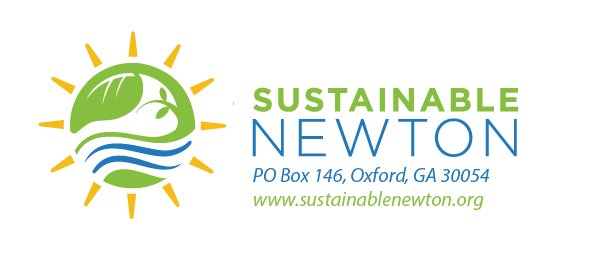|
By Emily Griffith, Sustainable Newton Secretary  If you’re reading this, odds are climate and environmental responsibility are important to you. And with public opinion polls showing 75% of Americans are alarmed, concerned, or cautious about climate change, you likely have family and friends on your shopping list who would appreciate a thoughtful gift given with sustainability in mind. But shopping, wrapping, and getting gifts to loved ones on time is stressful enough! Won’t fretting over environmental impact make that even harder? It’s actually easier than you may think, and Sustainable Newton is here to break down the terms and offer up some environmentally sound gift ideas for the holidays. Let’s start by identifying some items that contribute to waste and often go ignored.
2 Comments
By Emily Griffith, Sustainable Newton Member On Sunday, October 16, Sustainable Newton was one of ~50 organizations invited by the Ray C. Anderson Foundation to participate as Eco-Exhibitors for their RayDay Celebration at Serenbe in south Fulton County. It was an honor and privilege to be included in this annual celebration of the foundation's namesake. Sustainable Newton member Emily Griffith attended with her family and shares this first-hand account of a very amazing day. 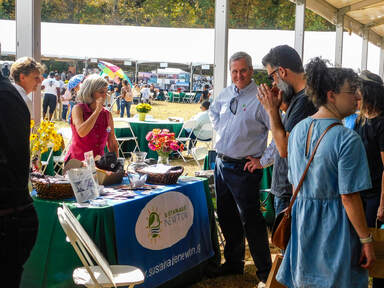 When my family and I embarked on our journey to Serenbe, we didn’t quite know what the day had in store. As we drove through the breathtaking countryside, I began to take note of my surroundings, making sure to soak up the atmosphere. The bustling noises of the city soon transformed into birds chirping and insects trilling. Sun-dappled roads lined with forest escorted us to our destination among the pines. As we inched closer to our destination, the serene and silent parade of electric vehicles signaled that our first-ever RayDay was just around the corner.
By Maurice Carter, Sustainable Newton President
“It ought to be remembered that there is nothing more difficult to take in hand, more perilous to conduct, or more uncertain in its success, than to take the lead in the introduction of a new order of things. Because the innovator has for enemies all those who have done well under the old conditions, and lukewarm defenders in those who may do well under the new." 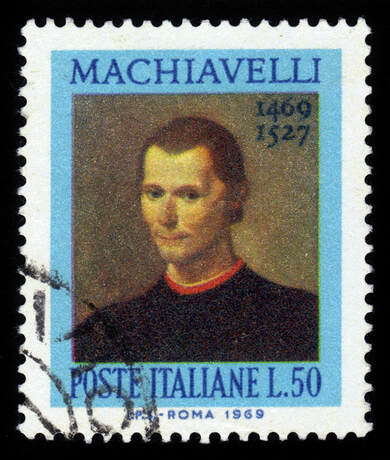
Niccolò Machiavelli's words from his 1532 work, The Prince, have never rang more true than now. Just ask President Joe Biden, whose climate agenda and proposed clean energy policies are the largest "new order of things" we've seen in America in our lifetimes. For the world, decarbonizing economies to respond to the climate crisis -- as agreed via the Paris Climate Agreement -- is likely the largest single undertaking in human history.
Stop in the Name of Love (of Money) By opposing President Biden's Clean Electricity Performance Program (CEPP), Sen. Joe Manchin (D-WV) casts himself as the visible face of the enemies Machiavelli noted. Manchin is doing very well under the current order of things through the backing of the coal, oil, and gas interests who have done extremely well themselves for decades. By Maurice Carter, Sustainable Newton President "I wish it need not have happened in my time," said Frodo. "So do I," said Gandalf, "and so do all who live to see such times. But that is not for them to decide. All we have to decide is what to do with the time that is given to us." Scientists tell us everyday: there have never been times such as these:
By Theodosia Wade, Former Sustainable Newton Board Member In March 2019, my husband Billy and I installed 12 solar panels on our roof as part of the Solarize Newton Morgan campaign. We were super excited to to reduce our carbon footprint, become a little more energy independent, and save money. Not only did the solarize campaign allow us to get better pricing on installation and materials, but it also did the leg work of choosing a reputable solar installer. We worked with folks who had already gone solar and others like us who were adding solar for the first time. It was a great experience.
Fast forward to today and we can look at the numbers to see how much electricity we're using and how much money we have saved over the last 2+ years.
By Sustainable Newton
By Mike McQuaide, Sustainable Newton Board Member
We celebrate Arbor Day in Georgia in February (on the 3rd Friday), when weather conditions are best for planting trees. This year, many communities are scaling back or canceling celebrations dues to COVID-19. So, we asked board member Mike McQuaide to reflect on his love of trees. 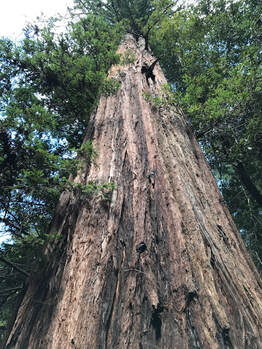
One year into the COVID-19 pandemic, many people have had occasion to focus more clearly on the features of life they value the most. The adage “you don’t miss your water until your well runs dry” is certainly applicable at this moment in American history. Being with friends and family indoors, going into restaurants and stores, freely traveling to distant places, and the many dimensions of life are suspended to some extent right now. Many of us find it insightful to step back and consider more deeply the features of life that we have taken for granted --but now seem out of reach-- at least for the time being.
Broadening our appreciation of the world we take for granted can bring a renewed appreciation and desire to protect the natural world. The natural environment is complex and diverse; one visible aspect of the natural world are the trees around us. Arbor Day provides an opportunity to step back and consider the many benefits of trees in our shared communities. The most visibly obvious benefits being the aesthetic advantages of trees. On a subconscious level, trees can evoke our sense of beauty. Office workers with a view of trees are more productive than those in windowless workplaces. Seeing trees can reduce our blood pressure and help our muscles to relax. By Maurice Carter, Sustainable Newton President 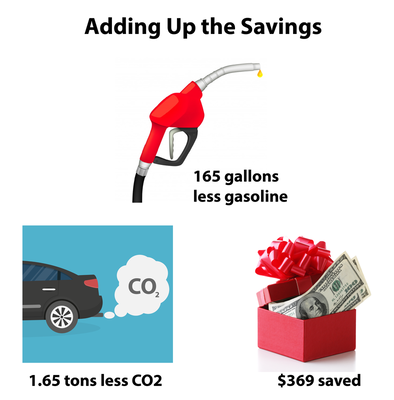 For our 2021 virtual kickoff Friday morning, we visited with Ray C. Anderson Foundation Executive Director John A. Lanier to discuss the Drawdown Georgia initiative. John gave us a hope-filled, inspiring look at the country's only state-centered climate action program. If you missed it, please take time to view the replay. Sustainable Newton is committed to doing all we can to promote the Drawdown Georgia effort and bring its 20 carbon-reduction solutions to households, businesses, and local governments in Newton County. Starting a new year is the perfect time to assess what personal changes I can make towards "bringing climate solutions home," as they say at Drawdown Georgia. Across the five key solution sectors (Electricity, Buildings and Materials, Food and Agriculture, Land Sinks, and Transportation), there are feasible actions we can each take to contribute to the overall 46 megaton carbon-reduction goal for the program. (Each megaton is one million tons.) By Maurice Carter, Sustainable Newton President 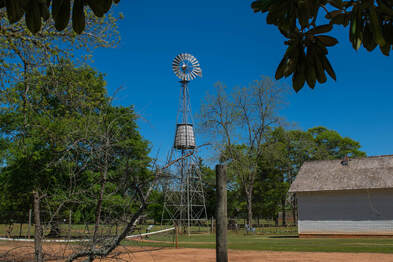 It wasn't always human nature. But, for those of us born since the middle of the 20th Century, technology is our go-to answer to every problem. When you think you can invent your way out of any mess, you kick the can down the road. We tell ourselves we'll deal with it later. Then, when we finally decide a situation like Climate Change must be addressed, it’s natural we gravitate to technical innovation to save us. There’s something sexy about gleaming solar panels, sleek wind turbines, smart buildings, and shiny, new Tesla automobiles.
By Maurice Carter, Sustainable Newton President In our 24 Hours of Reality: Countdown to the Future presentation on October 10, we asked and answered three key questions about humanity's response to the current climate crisis:  Our resounding "Yes!" to all three questions begs a fourth: "How will we change?" That's where Drawdown Georgia comes in. With their official launch on October 17, they identified 20 top climate solutions researchers have tagged as critical for Georgia to achieve a 35% reduction in carbon emissions by 2030. Using Paul Hawken's 2018 book Drawdown as a starting point, scientists from Georgia Tech, the University of Georgia, Emory, and Georgia State University studied the 100 solutions originally identified by Hawken and his colleagues to determine the highest potential actions for our state. The resulting blueprint for action features 20 solutions across five sectors (Buildings & Materials, Electricity, Transportation, Land Sinks, and Food & Agriculture) that collectively can cut carbon emissions in Georgia from 125 megaton to 79 megatons by 2030. By Maurice Carter, Sustainable Newton President  Even as a climate activist and leader of a sustainability organization, I'm still conflicted over President-Elect Joe Biden's commitment to sign an executive order on his first day in office to rejoin the US in the Paris Climate Agreement. I'm convinced we have years -- not decades -- to reverse climate change or face dire consequences, and I accept the urgent need for coordinated global action. The crisis is real. But, as a political pragmatist, I also know this back-and-forth reliance on executive action without congressional approval is ultimately getting us nowhere. By Maurice Carter, Sustainable Newton President 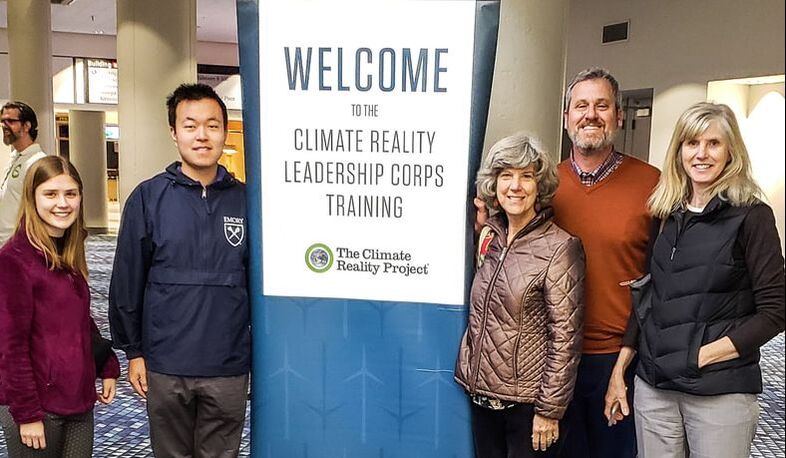 For anyone paying even the slightest attention to climate news, these are difficult days not to run screaming from the building. Then again, this summer, outside is no place to be. From unprecedented dual hurricanes Laura and Marco striking the US gulf coast last month to the scorching heat and raging wildfires now impacting California and Oregon, we're inundated with news about extreme weather caused by Climate Change. Throw in Siberian temperatures topping 100 degrees Fahrenheit and collapsing arctic ice shelves in Canada, and it's a little hard to remain hopeful. OK, nearly impossible. But, still, hope is not lost.
By Maurice Carter, Sustainable Newton President 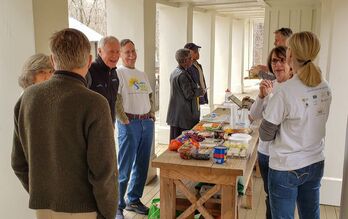 Ah, 2019, It Was Such a Simpler Time Ah, 2019, It Was Such a Simpler Time
"Don't it always seem to go, that you don't know what you've got 'til it's gone."
As I struggle to express my emotions in these socially-distanced, mostly virtual times, Joni Mitchell's lyrics jump to mind. Though now it's less about paving paradise than putting it under glass. Or, perhaps, it's we who are under glass. Has anyone else watched a television show or a movie recently and felt alarmed by scenes of people standing close together -- perhaps even <gasp!> shaking hands or putting a hand on a shoulder? Now, it's The Police I hear singing "Don't stand. Don't stand. Don't stand so close to me." It's the same way when I look back at photos of past Sustainable Newton events. By Maurice Carter, Sustainable Newton President 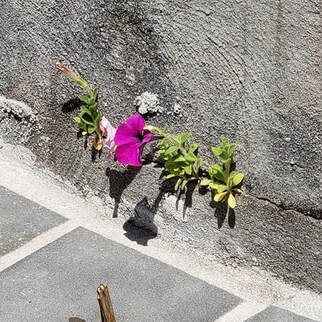 A petunia growing from a wall above my koi pond reminds me we're made of strong stuff. A petunia growing from a wall above my koi pond reminds me we're made of strong stuff. It's taken longer than I hoped -- weeks in fact -- to get to where I could organize my thoughts to share a few words about how we persevere with sustainability efforts in these troubling times. But, I suspect you all understand. It's a striking reminder how much life changed so quickly to reread my last post about Arbor Day written 43 days ago, on February 20. It was easy then to imagine young seedlings and saplings growing into mighty shade trees to shelter generations to come. But, thinking about that future is a more difficult task today. I find myself spending spare moments on days not occupied by the present to reflect on my past. Or, more accurately, the past of those who gifted life to me long ago. By Maurice Carter, Sustainable Newton President Society grows great when old men plant trees whose shade they know they will never sit in.
|
Categories
All
Archives
February 2024
|
Photos from Chemist 4 U, shixart1985 (CC BY 2.0), Juhele_CZ, EarthLED, shixart1985, EcuaVoz, Chemist 4 U


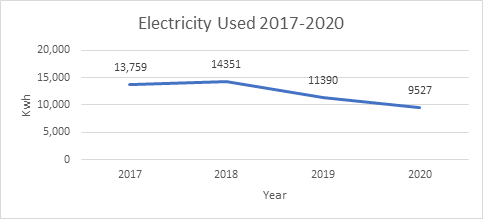


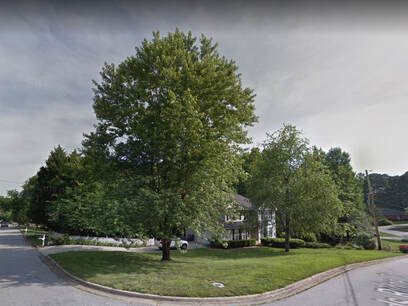
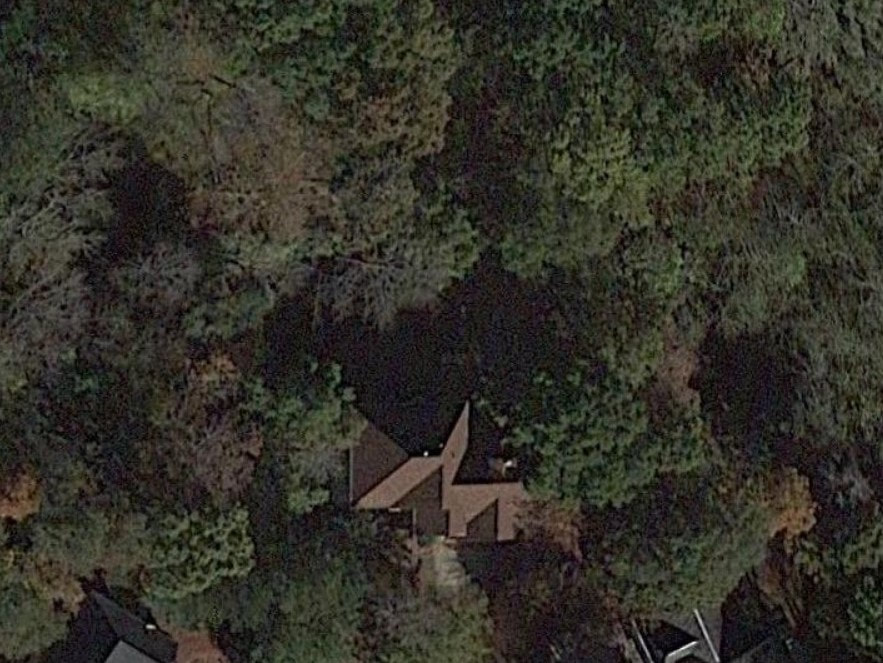
 RSS Feed
RSS Feed
